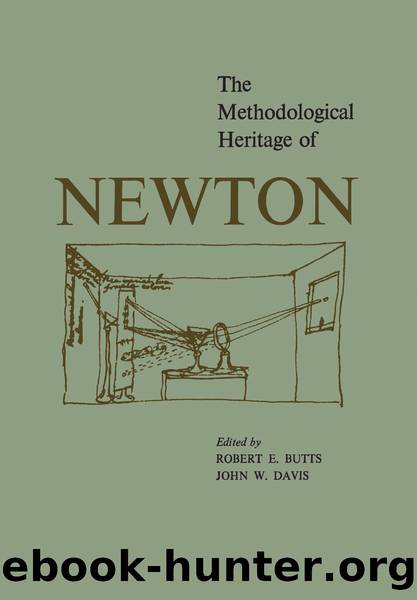The Methodological Heritage of Newton by Robert E. Butts

Author:Robert E. Butts [Butts, Robert E. and John W. Davis]
Language: eng
Format: epub
Publisher: University of Toronto Press
Published: 1970-08-14T16:00:00+00:00
VI
Thomas Reid and the Newtonian Turn of British Methodological Thought
L. L. LAUDAN
Introduction
In the famous passage in the preface to his Treatise, Hume expressed the fervent hope that he could do for moral philosophy what Newton had done for natural philosophy.1 In eighteenth-century ethics, literature, political theory, theology, and of course, natural science, similar sentiments were expressed openly and frequently.2 Newton’s Principia seemed to have established, almost overnight, new standards for rigour of thought, clarity of intuition, economy of expression and, above all, the certainty of its conclusions. At long last, natural philosophy, which had hitherto been open to such controversy and speculation, was established on an unshakable foundation. It was tempting to believe that conjecture had given way to fact and that an infallible system, based on rigorous inductions from experimental evidence, had finally been found.3 Outside of the natural sciences, where Newton’s real achievements were obscured by what scientific non-initiates took them to be, the enthusiasm for Newton reached an even higher pitch. Newton’s great contribution, it was said, was not so much his cosmological synthesis per se, but rather the formulation of a new conception of science and its methods. Newton was seen as the harbinger of an inductive, experimental learning which proceeded by a gradual ascent from the particulars of observation to general laws which were true and virtually incorrigible. What Bacon had prophesied in the way of an inductive interpretation of nature, Newton had brought to fruition.
Not surprisingly, therefore, many of Newton’s casual remarks on scientific method, especially the famous “Hypotheses non fingo,” were taken up as slogans and catch-phrases for intellectual reformers in almost every branch of human thought, especially in Britain. The eighteenth century has often been called the Age of Newton, and rightly so; but it was Newtonian, not so much in its physics or its metaphysics, as in its conception of the aims and methods of science. Putting it another way, it was Newton’s inductivism and experimentalism – in short, his peculiar kind of empiricism – rather than his optics or his mechanics that motivated the leaders (and the charlatans) of eighteenth-century English intellectual history.
There is, of course, nothing particularly new or original about the brief account I have just given; to the contrary, it represents the view of most historians of ideas who have studied the period. But there is a curious flaw in this oft repeated account of the development of British thought in the Enlightenment; namely, where do the professional philosophers come into the picture and how was the “Newtonian message” (which, as we have seen, was primarily a methodological and epistemological one) received among British philosophers? Although histories of philosophy often bracket Newton with the classical British empiricists, Locke, Berkeley, and Hume, such a conjunction is more misleading than illuminating, at least so far as the history of the philosophy of science is concerned. Indeed, those three empiricists are surprisingly un-Newtonian when it comes to questions of scientific method. Locke, for instance, died before most of Newton’s pronunciamentos on methodology were published, so we look in vain for signs of Newtonian influence there.
Download
This site does not store any files on its server. We only index and link to content provided by other sites. Please contact the content providers to delete copyright contents if any and email us, we'll remove relevant links or contents immediately.
| Anthropology | Archaeology |
| Philosophy | Politics & Government |
| Social Sciences | Sociology |
| Women's Studies |
The remains of the day by Kazuo Ishiguro(7551)
Tools of Titans by Timothy Ferriss(6950)
The Black Swan by Nassim Nicholas Taleb(6192)
Inner Engineering: A Yogi's Guide to Joy by Sadhguru(5897)
Giovanni's Room by James Baldwin(5879)
The Way of Zen by Alan W. Watts(5800)
The Six Wives Of Henry VIII (WOMEN IN HISTORY) by Fraser Antonia(4791)
The Power of Now: A Guide to Spiritual Enlightenment by Eckhart Tolle(4756)
Astrophysics for People in a Hurry by Neil DeGrasse Tyson(4620)
Asking the Right Questions: A Guide to Critical Thinking by M. Neil Browne & Stuart M. Keeley(4576)
12 Rules for Life by Jordan B. Peterson(3734)
The Ethical Slut by Janet W. Hardy(3504)
Skin in the Game by Nassim Nicholas Taleb(3462)
Housekeeping by Marilynne Robinson(3402)
The Art of Happiness by The Dalai Lama(3385)
Double Down (Diary of a Wimpy Kid Book 11) by Jeff Kinney(3274)
Skin in the Game: Hidden Asymmetries in Daily Life by Nassim Nicholas Taleb(3264)
Walking by Henry David Thoreau(3234)
12 Rules for Life: An Antidote to Chaos by Jordan B. Peterson(3204)
